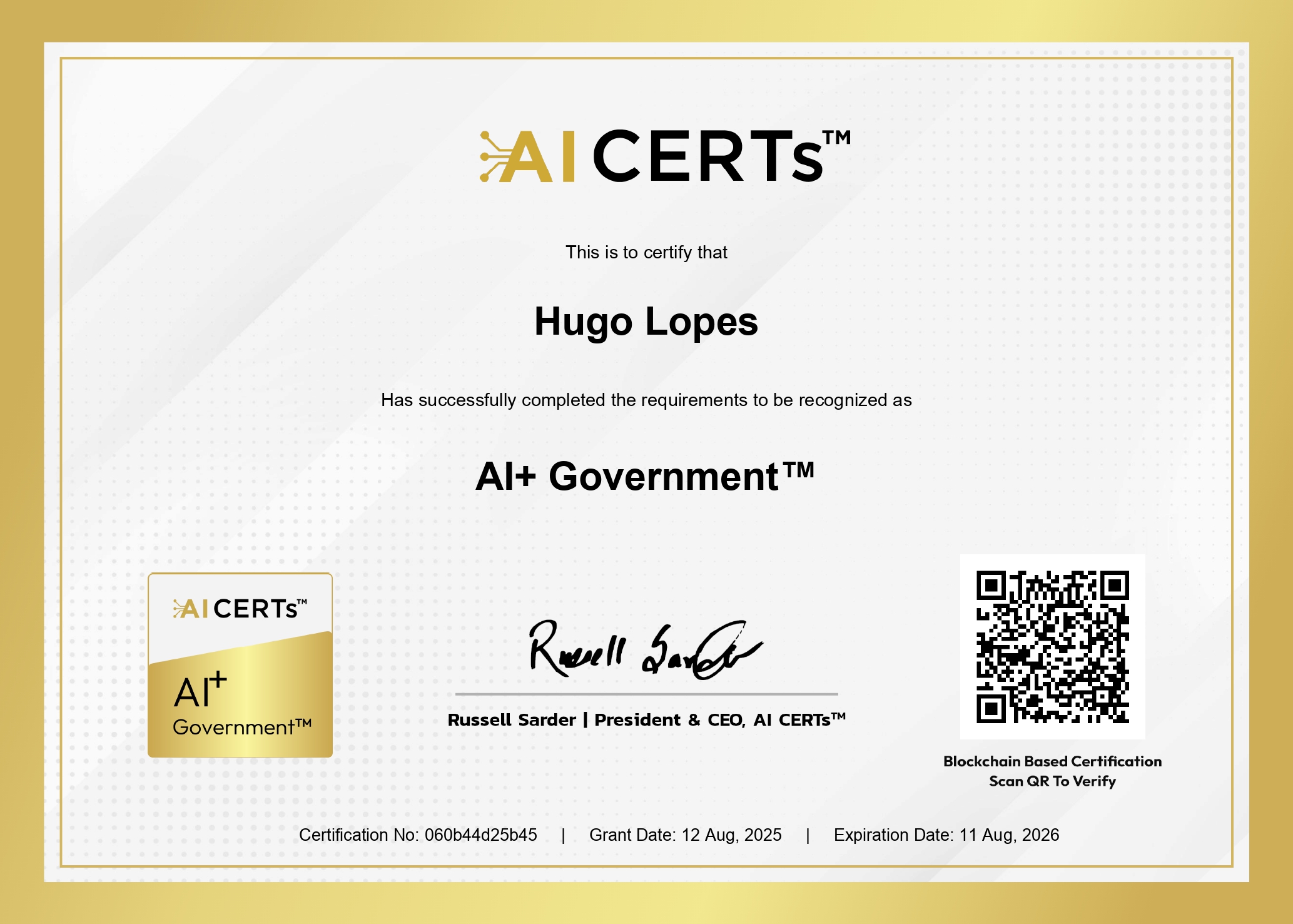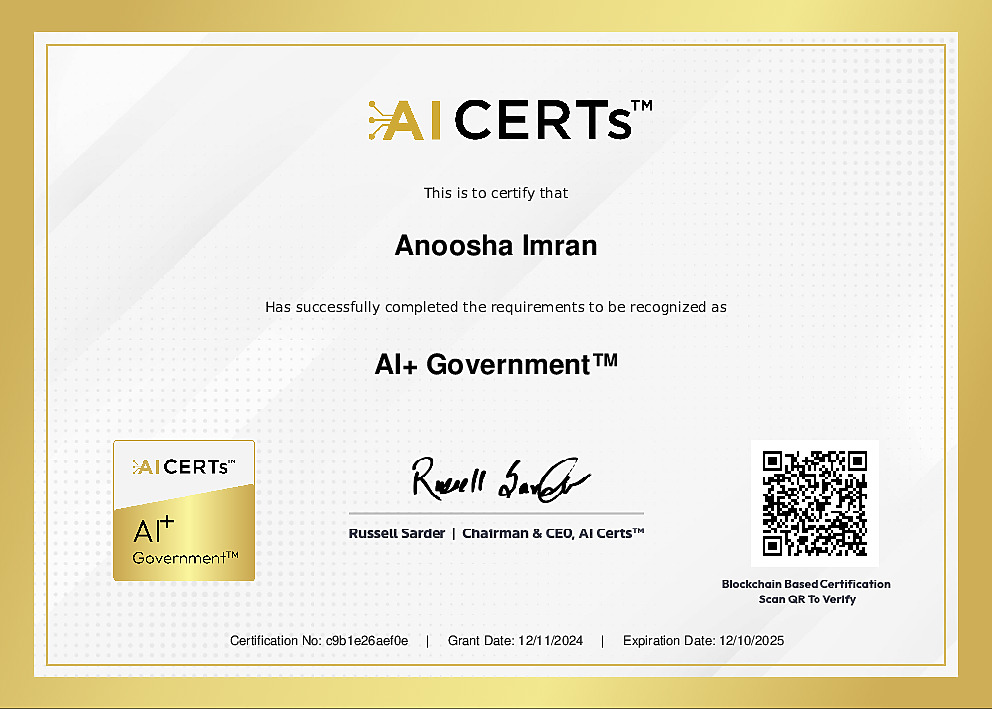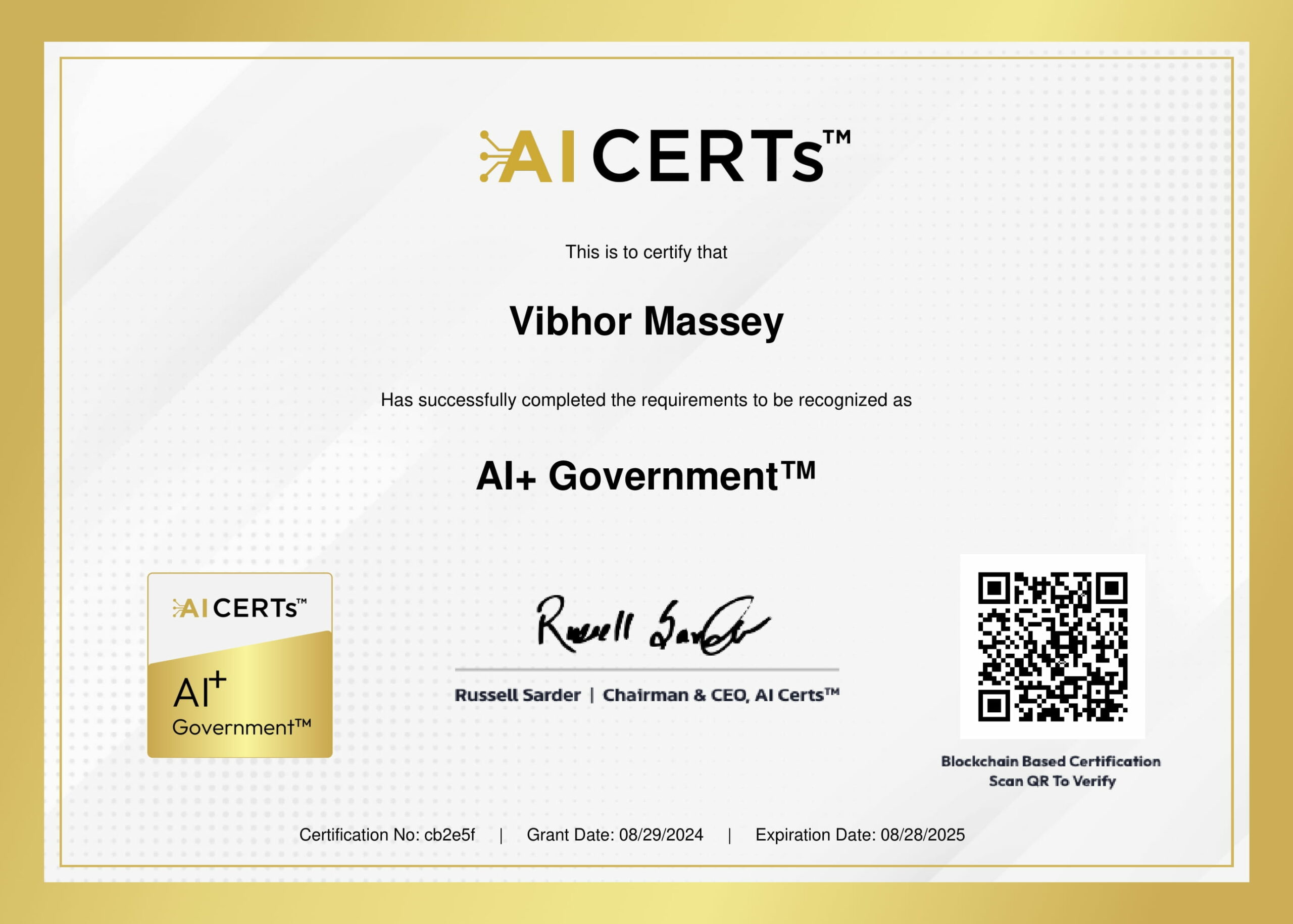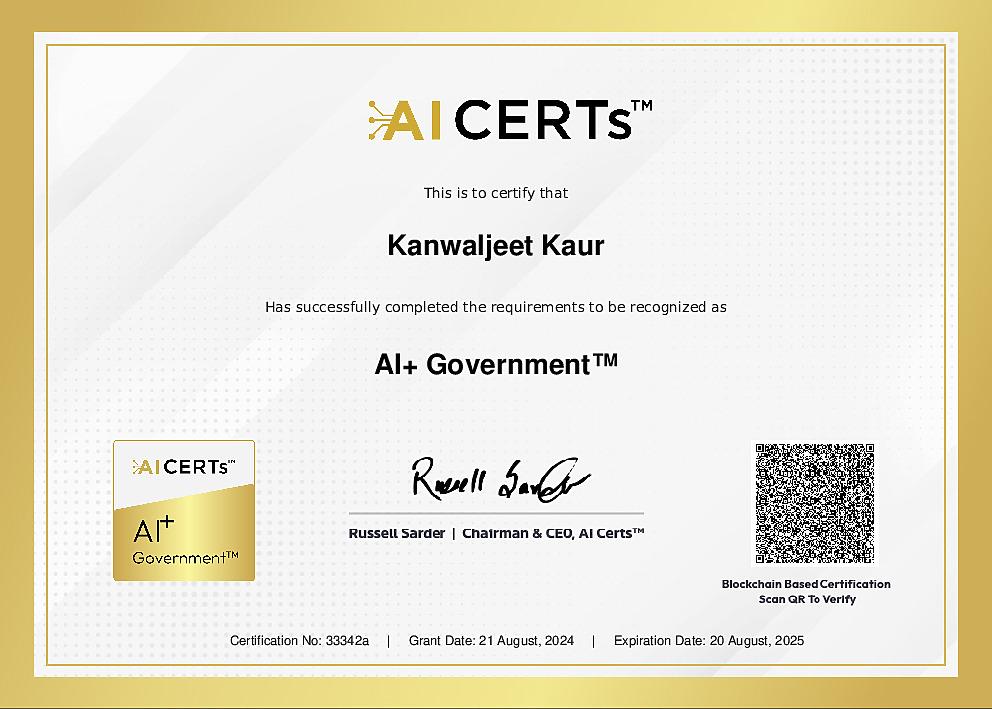AI+ Government™
AP-490
Transform Public Policy with Intelligent Solutions- AI for Governance: Understand how AI transforms public governance and policy frameworks
- Data & ICT Focus: Dive into data management algorithms, ICT techniques, and AI strategies for government
- Ethical Implementation: Gain expertise in responsible AI integration and policymaking
- Outcome-Oriented: Design AI-driven solutions that promote transparency and operational efficiency
Why This Certification Matters
At a Glance: Course + Exam Overview
- Instructor-Led: 1 day (live or virtual)
- Self-Paced: 8 hours of content

Who Should Enroll
Government Officials & Policy Makers: Leverage AI for data-driven decision-making and efficient public services.
Data Scientists & Analysts: Utilize AI for analyzing government data and creating predictive models.
Public Sector IT Professionals: Implement AI solutions to modernize infrastructure and enhance operational efficiency.
Cybersecurity Experts: Apply AI to strengthen national security and protect government systems from emerging threats.
Students & New Graduates: Acquire essential AI skills for a promising career in the evolving field of AI-driven government initiatives.
Industry Growth: Enabling Smart Governance, Policy Intelligence & Public Sector Innovation
- The global AI in government market is projected to grow from $12.6 billion in 2023 to $78 billion by 2033, reflecting a CAGR of 20%. (Source: Market.us)
- AI-powered tools are transforming public sector operations, enhancing data processing, decision-making, and service delivery.
- Governments are increasingly adopting AI for predictive analytics, aiding in the formulation of informed and effective policies.
- AI-driven automation is becoming essential for improving efficiency in public service management and reducing operational costs.
- AI is revolutionizing sectors like public health, national security, finance, and regulatory compliance, driving digital transformation across government agencies.

Skills you will gain
- Machine Learning for Policy Analysis
- AI-Driven Fraud Detection
- Automated Decision-Making Systems
- AI in Smart Cities and Infrastructure
- Geospatial Data Analysis with AI
What You'll Learn
- Course Introduction
- 1.1 Overview of AI Concepts and Applications in Government
- 1.2 Historical Perspective and Evolution of AI in Public Sector
- 1.3 Importance of AI in Government
- 1.4 Role of AI in Addressing Governmental Challenges
- 1.5 Ethical Considerations and Responsible AI Practices
- 1.6 Real-World Case Studies
- 2.1 Regulatory Landscape for AI in Government
- 2.2 Formulating AI Strategies Aligned with Government Objectives
- 2.3 Public-Private Partnerships
- 2.4 International Policy Frameworks
- 2.5 Compliance, Privacy, and Security Considerations
- 3.1 Data Collection, Storage, and Processing Using AI Techniques
- 3.2 Data Quality and Bias Mitigation
- 3.3 Data Privacy Regulations and Compliance
- 3.4 Data Lifecycle Management in Government Agencies
- 3.5 Data Quality Assurance and Governance Frameworks
- 3.6 Data Sharing Protocols and Interoperability Standards
- 4.1 Personalized Learning Platforms and Adaptive Assessment Tools
- 4.2 AI-enabled Tutoring Systems and Educational Content Recommendation
- 4.3 Addressing Equity and Accessibility Challenges in AI-driven Education
- 4.4 Implementation of ICT Techniques in Teaching Learning System for Officials
- 4.5 Inclusive and Accessible AI Solutions
- 5.1 Predictive Policing, Crime Mapping, and Threat Detection Using AI
- 5.2 Disaster Response, Public Health and Emergency Management with AI Technologies
- 5.3 Privacy Concerns and Ethical Considerations in AI-powered Security Systems
- 5.4 AI in Forensic Investigations
- 6.1 Enhancing Citizen Engagement and Service Delivery with AI
- 6.2 Chatbots, Virtual Assistants, and Personalized Recommendations
- 6.3 Designing AI-driven Interfaces Exclusively for Those with Disabilities in Using Government Portals and Applications
- 6.4 AI Platforms to Direct the Common Man to Reach the Officials
- 6.5 AI-driven Quick Response System for Those with Disabilities with SoS Model
- 7.1 Planning and Executing AI Projects in Government Agencies
- 7.2 Legacy System Modernization
- 7.3 Integration with Existing Systems and Workflows
- 7.4 Case studies of AI Applications in Various Government Sectors (e.g., Healthcare, Transportation, Public Safety)
- 7.5 Best Practices for Implementing AI Projects in Government
- 8.1 Developing an AI Strategy for Government Organizations
- 8.2 Emerging Trends in AI and Their Potential Impact on Government Services
- 8.3 Exploring Cutting-edge AI Research and Innovations in Government Sectors
- 8.4 Impact of Emerging Technologies (e.g., AIoT, Quantum Computing) on Government Services and Societal Benefits
- 8.5 Continuous Learning, Adaptation and Sustainability in Technological Advancements in the AI Field
- 1. What Are AI Agents in Government
- 2. Significance of AI in Government Operations
- 3. Core Applications of AI Agents in Government
- 4. Trends and Future Direction
Tools You’ll Master

IBM Watson Government

Microsoft Azure Government

Palantir Gotham

Accela Civic Platform
Prerequisites
- Basic familiarity with AI fundamentals, without the need for technical expertise.
- Keen interest in understanding how AI can be strategically integrated into governmental processes.
- Readiness to think innovatively and generate ideas is essential for effectively utilizing AI tools within governmental operations.
Exam Details
Duration
90 minutes
Passing Score
70%
Format
50 multiple-choice/multiple-response questions
Delivery Method
Online via proctored exam platform (flexible scheduling)
Exam Blueprint
- Introduction to Artificial Intelligence (AI) in Government – 10%
- AI Governance and Policy Frameworks – 15%
- AI-Driven Data Management and Governance – 10%
- AI in Education and Skills Development – 15%
- AI for Public Safety and Security – 15%
- AI for Citizen Services – 10%
- AI Implementation and Integration in Government – 15%
- AI Strategies, Future Trends and Emerging Technologies – 10%
Choose the Format That Fits Your Schedule
What’s Included (One-Year Subscription + All Updates):
- High-Quality Videos, E-book (PDF & Audio), and Podcasts
- AI Mentor for Personalized Guidance
- Quizzes, Assessments, and Course Resources
- Online Proctored Exam with One Free Retake
- Comprehensive Exam Study Guide
Instructor-Led (Live Virtual/Classroom)
- 1 day of intensive training with live demos.
- Real-time Q&A and peer collaboration
- Led by AI Certified Trainers and delivered through Authorized Training Partners.
Self-Paced Online
- ~8 hours of on-demand video lessons, e-book, and podcasts
- Learn anywhere, anytime, with modular quizzes to track progress.
Discover Your Ideal Role-Based Certifications and Programs!
Not sure which certifications to go for? Take our quick assessment to discover the perfect role-based certifications and programs tailored just for you.
Get CertifiedFrequently Asked Questions
The course employs a blend of modules, case studies, videos, quizzes, and hands-on exercises to ensure a comprehensive understanding and practical application of AI technologies in government.
The course aims to equip participants with the knowledge and skills to design AI-driven solutions for tasks ranging from data analysis to policy formulation in government settings. It also focuses on understanding ethical and regulatory considerations surrounding AI implementation in the public sector.
By completing the AI+ Government™ Certification, participants will gain proficiency in leveraging AI to promote efficiency, transparency, and innovation in governmental operations. This expertise is highly valued in roles involving policy development, public service optimization, and government modernization.
Graduates of the AI+ Government™ Certification can explore roles such as AI Strategy Consultant, Government Data Analyst, Policy Advisor for AI Initiatives, AI Project Manager in Government Agencies, and more. The certification equips professionals to drive innovation and efficiency in public sector operations.
AI adoption in government enhances operational efficiency by automating routine tasks, improves data-driven decision-making through advanced analytics, enhances citizen services with personalized interactions, and strengthens public safety and security measures with predictive capabilities.











